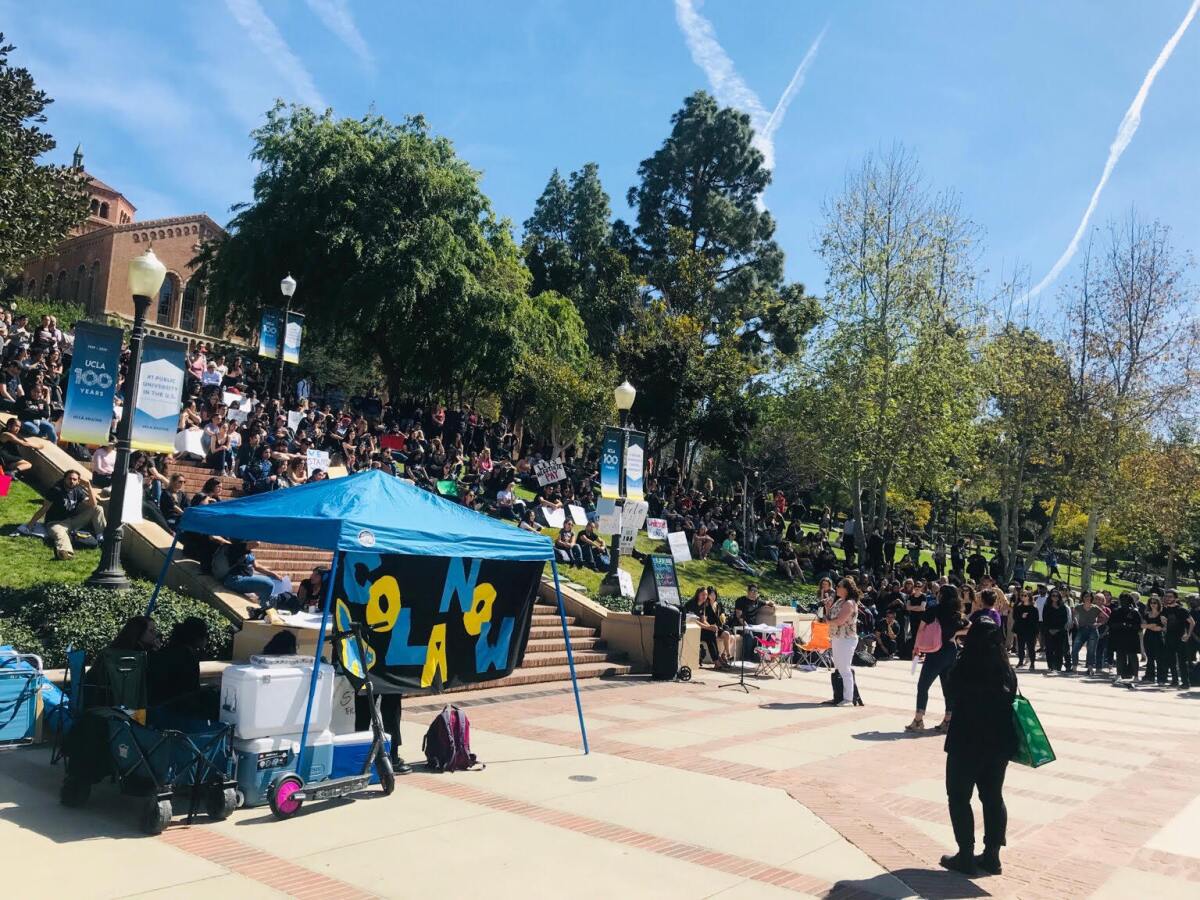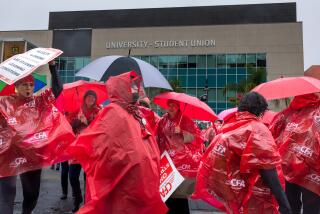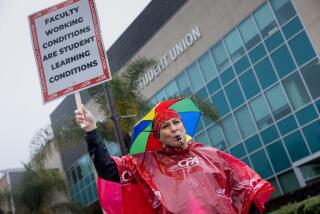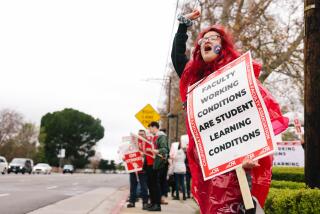UC graduate students threaten more strikes as movement grows

A growing number of students and faculty members across University of California campuses walked out of class, held rallies and signed letters this week, as a systemwide movement takes hold in support of graduate students demanding cost-of-living adjustments to their salaries.
During widespread UC campus demonstrations, students filled the Janss Steps at UCLA, Sproul Plaza at UC Berkeley and Cheadle Hall at UC Santa Barbara on Thursday and other pickets unfolded on Friday. At Santa Cruz — where the protests began three months ago with a wildcat grading strike that ended in the dismissal of some student workers — students blocked entrances to campus. At UC Riverside and UC Irvine crowds marched.
“Out of the labs, into the streets!” they chanted, and “Give us COLA, we demand it!”
“It seems to be growing like crazy within the UC,” said Sherry Ortner, professor of anthropology at UCLA. “I think this could really become a national issue.”
Students at UC San Diego voted to begin a grading strike next Monday. Those gathered at UCLA voted to go on a full teaching strike as early as next week if graduate students in at least 10 departments vote in favor.
The movement began with UC Santa Cruz “wildcat” strikes, so named because they were done without union authorization. Teaching assistants went on grading strike in December, seeking a $1,412-per-month cost of living increase. That escalated to a full teaching strike last month, during which students and police clashed.
Approximately 80 students who participated in the strike were later dismissed from their teaching assistant positions or told they would no longer be considered for spring appointments. In response, more than 500 Santa Cruz graduate students across 22 departments pledged not to accept teaching assistant positions made available through the terminations of others.
“The University of California values all our graduate students, including academic student employees (ASEs) who are essential to UC’s teaching mission, supporting the University as teaching assistants, readers and tutors. However, that mission is in jeopardy when ASEs refuse to fulfill their teaching obligations,” Andrew Gordon, associate director of media relations for UC’s Office of the President, said in an emailed statement.
The statement said teaching assistants who refuse to submit grades or teach are in violation of the university’s contract with their union, which includes a no-strike clause. And, it said, that contract includes “fair pay and excellent benefits,” including 100% tuition reimbursement, annual wage increases of 3% over four years, remission of healthcare premiums and campus fees, and a child-care subsidy.
Despite the wildcat job actions, the movement got a boost this week from the union’s bargaining team, which announced it would hold a vote in early April on whether to authorize a statewide unfair labor practice strike over the disciplining of the Santa Cruz workers and other issues.
“We have been calling for the University to come to the table and negotiate a Cost of Living Adjustment for months now.… They continue to refuse,” Kavitha Iyengar, president of UAW Local 2865, said in a statement. The union said it represents more than 19,000 academic workers across the UC system.
Graduate teaching assistants at UC earn an average monthly salary of $2,400 per month. Those on strike said that amount is vastly out of step with their cost of living. In Santa Cruz, monthly rent and utilities averages about $1,340.
Students at UC Santa Cruz said they had hoped for some relief from their union, a city rent control measure or intervention by the campus chancellor, but none came.
“The wildcat was our best option,” said Marcelo Mendez, a sociology doctoral candidate at UC Santa Cruz who was dismissed from his teaching assistant position. He’s not sure he has the means to return as a student in the next term.
“Realistically there’s no way of getting an education next quarter without incurring massive debt,” Mendez said.
At UC Davis and UC Santa Barbara, some graduate students are on strike as well, although the number is unclear. At San Diego they will begin a grading strike Monday, and at Berkeley the graduate students in five departments have declared themselves “strike ready.”
The strikers have garnered support nationwide and even abroad, with students at the University of North Carolina at Chapel Hill, Notre Dame, University of Mississippi and University of Sussex expressing solidarity online.
Faculty, too, have joined. The UC’s Academic Council issued a letter to President Janet Napolitano calling on UC not to retaliate against graduate students and to roll back the police presence at Santa Cruz. At UCLA, 300 faculty members across disciplines signed an open letter to graduate students promising not to retaliate against any who demonstrate for a pay increase.
“The undersigned faculty wants you to know that we support our graduate and undergraduate students,” the letter reads. “We understand that a graduate student Cost of Living Adjustment (COLA) would benefit graduate students’ well-being. We are generally concerned that while ASE wages have risen by merely 3%, the cost of living in Los Angeles and beyond has risen much more.”
Hundreds of faculty members at Berkeley and Davis signed similar letters.
“Teachers do not live on apples alone,” one commented alongside her name.
“Shame on UCOP. Reinstate the fired grad students,” wrote another, referring to UC’s Office of the President.
Many who signed on teach about homelessness, food insecurity, and gender and race inequities. But the support extended beyond those areas.
“For the UC system to thrive ... it’s essential to recruit the best and brightest students,” Paul Barber, professor of ecology and evolutionary biology, wrote in an email. “It’s really important that our students can afford to come to UCLA.... Addressing this issue is critical to ensure equal access to California students from all socioeconomic backgrounds.”
Sucharita Kanjilal, a doctoral candidate in anthropology and an organizer at UCLA, said support from the faculty is particularly meaningful and called them “our closest allies.”
“They’re the ones who brought us here, they care about our research, they care about our work,” she said.
The UCLA graduate students assembled Thursday were demanding reinstatement of the dismissed workers at Santa Cruz as well as their own cost-of-living increase of about $2,600 per month, Kanjilal said.
Kanjilal, an international student from India, said she spends 50% of her salary to rent a room in a three-bedroom house in Palms. Her visa strictly limits where and how much she can work.
“In some ways our financial situation is even more precarious,” she said. “You’re stuck with that money.”
More to Read
Start your day right
Sign up for Essential California for news, features and recommendations from the L.A. Times and beyond in your inbox six days a week.
You may occasionally receive promotional content from the Los Angeles Times.







